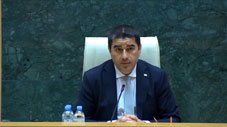
Shalva Papuashvili Addresses 'Unjust' Criticism from the West
By Liza Mchedlidze
Thursday, June 1, 2023
Shalva Papuashvili, the Chairman of the Parliament of Georgia, took to Twitter to release a comprehensive statement addressing Irakli Gharibashvili's perspective on the motives behind Russia's invasion of Ukraine. In his statement, Papuashvili argued that Georgia faces unwarranted criticism from the Western countries and emphasized the importance of interpreting Gharibashvili's remarks accurately.
According to Papuashvili, Georgia has the right to question the inconsistent and sometimes 'hypocritical' treatment it has received from certain friends and critics. He pointed out that Georgia's independence and security have been constantly endangered, starting from the Soviet era, with Russian-incited separatism, followed by a direct invasion 15 years ago, and ongoing challenges such as illegal borderization, the abduction of Georgian citizens, and the gradual annexation of Georgian territories.
"We have the right to question the duplicity of some of our friends' and critics' attitude because many times now, Georgia was subject to unfair, almost hypocritical treatment.
Since the Soviet times, Georgia's independence and security has been jeopardized: First by Russian-incited separatism, and then by outright Russian invasion 15 years ago, and then again, with illegal borderization, kidnapping of Georgian citizens, and creeping annexation of Georgian territories," Papuashvili wrote.
Papuashvili highlighted the perceived indifference of the West towards Georgia's precarious situation under foreign occupation. He pointed out that Western countries imposed an effective arms embargo on Georgia shortly after the 2008 war, followed by a 'reset' in relations with Russia.
He criticized the increase in foreign trade between the West and Moscow, which he believes subjected many Western economies to Russian energy dominance. Furthermore, Papuashvili stated that many Western countries are hesitant to label Russia's actions in the occupied Georgian territories as occupation, even to this day.
"Meanwhile, despite Georgia's precarious existence under the foreign occupation and daily experience of threats and harassment, the West remained unfazed. Western countries imposed a de-facto arms embargo on Georgia immediately after the 2008 war and soon declared 'reset' with Russia. In subsequent years, the West increased foreign trade with Moscow to unprecedented levels, subjugating many Western economies to Russian energy diktat. Many Western countries, to this day, are afraid of calling Russian actions in the invaded Georgian territories its proper name - occupation," Papuashvili wrote.
The Chairman pointed out the shift in dynamics following the repeated Russian invasion of Ukraine. He expressed confusion over the criticism Georgia has faced for allegedly being 'pro-Russian', despite its unwavering pro-Western stance. Papuashvili emphasized that Georgia has maintained a responsible policy of strategic patience towards Russia, refraining from imposing bilateral sanctions and not reciprocating Russia's decision to resume direct flights to Georgia. He argued that this approach aimed to lift the unjust punishment imposed on the Georgian people.
"Only now, after the repeated Russian invasion of Ukraine, the situation has changed dramatically. However, even though Georgian policy was and remains steadfastly pro-Western, Georgia is now, inexplicably, criticized for being 'pro-Russian'! All Georgia did was to continue its responsible policy of strategic patience towards Russia, scrupulously practiced for many years now. This policy implies not imposing bilateral sanctions on Russia and not sanctioning Russia back for the latter's decision to resume direct flights to Georgia, thus lifting the unfair punishment against our people." Shalva Papuashvili wrote.
According to Papuashvili, Georgians have negative perceptions towards the inconsistent and unfounded criticism by Western partners. He highlighted several points of concern.
Firstly, he noted that the aggression against Georgia during the war was just as brutal and devastating as the Russian invasion of Ukraine. However, it received little Western backlash at the time, leading to a sense of unfair treatment.
Secondly, despite Georgia lacking security guarantees from the West, the country is often urged to act boldly. Papuashvili argued that this expectation is unrealistic, as Georgia cannot mount the same level of resistance as NATO-protected countries under Article 5.
Thirdly, Papuashvili addressed the criticism faced by Georgia for not imposing bilateral sanctions on Russia. He explained that such sanctions would disproportionately harm Georgia's economy while causing minimal damage to Russia. Moreover, he emphasized that any retaliation from Russia would be detrimental to Georgia's economy and statehood.
Lastly, Papuashvili expressed disappointment that countries that recently joined NATO and the EU, gaining geopolitical security, are now the ones voicing the most concerns about Georgia's struggles. He highlighted the lack of reciprocal steps from the West despite Georgia's continuous efforts to join NATO and the EU. Papuashvili mentioned that Georgia was even denied candidate status last year, despite being a clear frontrunner among the Associated Trio.

